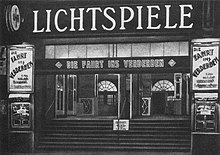Hans Schliepmann
Johannes Karl Gottfried "Hans" Schliepmann (born November 26, 1855 in Strausberg , Brandenburg , † November 20, 1929 in Berlin ) was a German writer and architecture author.
Act
Schliepmann was a son of the pharmacist Otto Carl August Schliepmann and his wife Elise Caroline Wilhelmine nee. Bolle. In 1882 the family moved to Berlin, where Hans attended the Dorotheenstädtische Realgymnasium. He then studied at the Technical University and the Royal Building Academy in Berlin. From 1881 to 1884 he worked as a site manager in Metz , Strasbourg and Frankfurt am Main . From 1886 he worked as a government master builder in Berlin, later in the technical office of the ministry. From 1905 he was active as a royal building officer, most recently as the magistrate's senior building officer.
As part of this activity, he presented the two-volume work “Commercial and Department Stores : From Shop to Grand Magasin” (Volume I) and “The Further Development of Department Stores” (Volume II) at the Göschen Collection in 1913 . In 1914 he wrote the first monograph on cinema architecture in Germany. He also wrote articles for the trade journals "Illustrirte Kunstgewerbliche Zeitschrift für Interior Decoration" and for the Berlin architecture world (whose editor he was temporarily), such as "The new designs for the Berlin Royal Opera House " and "The color in monumental art " .
1984 appeared in the anthology "Neuland: A collector's book of modern prose poetry" Schliepmann's story "Zwei Träume (Silver Grids, Life)" . In the following years Schliepmann wrote not only poetry, but also humoresques and prose , e.g. Sometimes under the pseudonym Eberhard Treubier (like the Tugend-Gracche , 1895). Under the pseudonym Siegfried Pentha-Tull , he published the essay volume “Die victorious Weltanschauung (Neo-Machiavellian) and we Jews” in 1920 .
Schliepmann also belonged to the inner circle of the so-called “criminal tribal table”, in which the writer and draftsman Paul Scheerbart also frequented. He celebrated particular successes in Berlin bohemian as Eberhard Treubier with his poetry readings . He also wrote reviews of current Berlin art exhibitions and trends, such as the “ Munch Fall ”. Alfred Kerr reported in his “Berliner Letters” in 1895 about the ( satirical ) celebrations for Eberhard Treubier's seventieth birthday, at which Max Halbe , Hermann Hendrich , Paul Schlenther , Sigmund Lautenburg and Otto Erich Hartleben were also present.
family
Hans Schliepmann was born on November 26th, 1891 with Elise Auguste Helene. Jaenke (born October 5, 1860) married.
Works on architecture (selection)
- Considerations on architecture - for the understanding of modern questions of architecture . Berlin 1891
- The Berlin elevated railway as a work of art . In: Berliner Architekturwelt . tape 4 , no. 9, 10 , 1902, pp. 303 ff., 339 ff. (end) ( digitized , digitized (end) ).
- The new designs for the Berlin Royal Opera House. Berliner Architekturwelt, special issue 12. Berlin: Wasmuth , 1913. Digitized by the Central and State Library Berlin, 2020. https://nbn-resolving.de/urn:nbn:de:kobv:109-1-15382701
- Berlin bridges . In: Berliner Architekturwelt . tape 16 , no. 7 , 1914, pp. 261 ff . ( Digitized version ).
- Lichtspieltheater: A collection of executed movie theaters in Berlin . Schliepmann, Hans. Berlin: Verlag von Ernst Wasmuth A.-G. 1914. Digitized by the Central and State Library Berlin, 2020. https://nbn-resolving.de/urn:nbn:de:kobv:109-1-15386136
- From the Dresden building exhibition . In: German art and decoration
Literary and essayistic works (selection)
- Muse firstlings, chosen by Eberhard Treubier . Berlin: German Writers' Cooperative 1895
- We Educated (1896)
- Germanization and the Jewish Question (1917)
- The Few and the Many (1918)
- Strange stories. Funny Eulenspiegeleien. Leipzig and Hamburg, Matthes, 1919
- The victorious worldview (Neo-Machiavellian) and we Jews. Leipzig; Hartenstein in the Ore Mountains: Schreiber, 1920
- What fills life - a novel for the contemplative . Leipzig u. Hartenstein: Erich Matthes 1920
- Sunday celebration . Publishing house of the Association for Social Ethics and Art Care in Berlin, 1922
- From a blessed heart. House chronicle of the Hoffer family from 1825 to 1870 . Erich Matthes, Leipzig, 1924
- Life symphony . Selected poems from fifty years. B. Behrs Verlag / Friedrich Feddersen, 1927
Web links
- Works by Hans Schliepmann in the Gutenberg-DE project
- Entry at worldcat.org
- Entry in the German Digital Library
Individual evidence
- ↑ [1]
- ^ Brümmer, Franz: Lexicon of German poets and prose writers from the beginning of the 19th century to the present. Vol. 6. 6. Edition Leipzig, 1913.
- ^ German biographical encyclopedia: (DBE), edited by Rudolf Vierhaus
- ^ "Media Studies: A Handbook for the Development of Media and Forms of Communication. 1st volume “ (= handbooks for linguistics and communication science), part 2 edited by Joachim-Felix Leonhard, Hans-Werner Ludwig, Dietrich Schwarze. De Gruyter 1999
- ↑ Entry at HEIDI University of Heidelberg
- ↑ Neuland: A Collection of Modern Prose Poetry (1894), edited by Dr. Caesar Flaischlen, 2018
- ↑ Timm Reimers: Scholarship, Politics and Spectacle: Transformations of the German Roman Tragedy 1800-1900 . De Gruyter 2016, ISBN 978-3-11-042678-6
- ↑ Entry in Literaturlandschaft Berlin-Brandenburg
- ↑ See Paul Scheerbart: 70 trillion world greetings. A biography in letters . (1991) and Scheerbart, Paul: Das Paradies. The home of art. (Romanessay), Berlin: Commissionsverlag George & Fiedler, 1889
- ↑ Where is Berlin ? Letters from the imperial capital 1895–1900. Edited by Günther Rühle. Structure, Berlin 1997, ISBN 3-351-02830-X . (Article in the "Breslauer Zeitung")
- ↑ Entry at Aphorismen.de
| personal data | |
|---|---|
| SURNAME | Schliepmann, Hans |
| ALTERNATIVE NAMES | Schliepmann, Johannes Karl Gottfried |
| BRIEF DESCRIPTION | German writer and architect |
| DATE OF BIRTH | November 26, 1855 |
| PLACE OF BIRTH | Strausberg , Brandenburg |
| DATE OF DEATH | November 20, 1929 |
| Place of death | Berlin |
